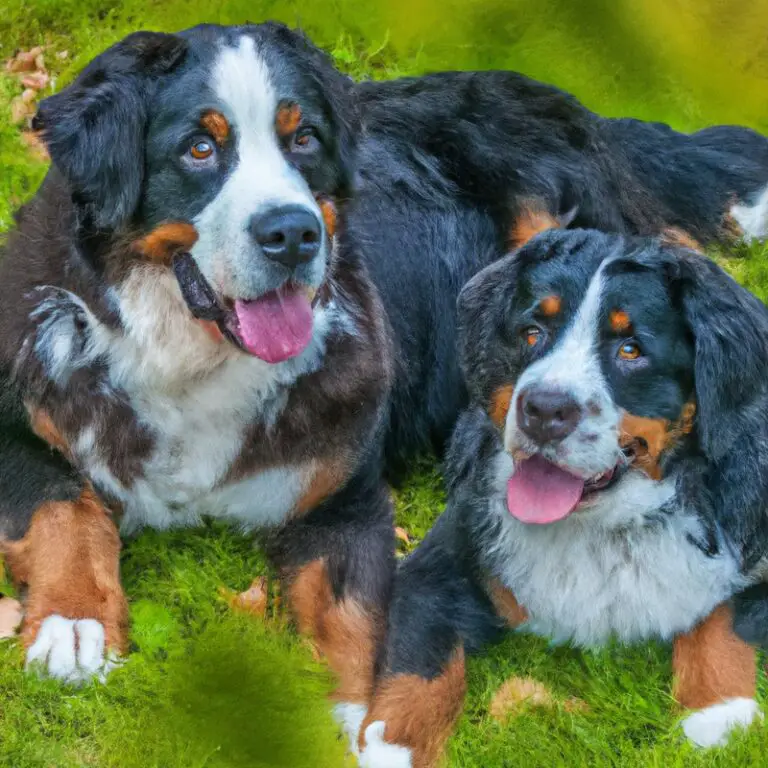What Is The Ideal Diet For Bernese Mountain Dogs?
Key Takeaways:
- Proper nutrition for Bernese Mountain Dogs should consist of high-quality, balanced commercial dog food.
- A diet rich in protein and moderate in fat is essential for the overall health and wellbeing of Bernese Mountain Dogs.
- You should avoid feeding Bernese Mountain Dogs foods that are toxic to them, such as chocolate, grapes, and onions.
- Consult with a veterinarian to determine the specific dietary needs of your Bernese Mountain Dog based on their age, weight, and activity level.
Are you a proud owner of a Bernese Mountain Dog, or considering getting one? Well, let’s talk about something crucial for your furry friend’s health and happiness – their diet! Just like humans, dogs have specific nutritional needs, and finding the ideal diet for your Bernese Mountain Dog is key to their overall well-being.
As an expert in canine nutrition, I’m here to guide you through understanding their dietary requirements, feeding guidelines, and selecting the right food for your beloved pup.
So, get ready to learn how to keep your Bernese Mountain Dog happy, healthy, and wagging that adorable tail!
| Diet Component | Recommendation |
| Protein | High-quality animal protein sources such as lean meats (chicken, turkey, beef) or fish |
| Fat | Moderate amounts of healthy fats from sources like fish oil or flaxseed oil |
| Carbohydrates | Whole grains (e.g., brown rice, oats) and vegetables for energy and fiber |
| Fruits and Vegetables | A variety of fruits and vegetables for added vitamins, minerals, and antioxidants |
| Calcium | Appropriate levels of calcium for bone health (consult a veterinarian for the exact amount) |
| Water | Always provide fresh, clean water for hydration |
Understanding the Nutritional Needs of Bernese Mountain Dogs
Protein Requirements for Bernese Mountain Dogs
Bernese Mountain Dogs have higher protein requirements due to their large size and active lifestyle. It is recommended to feed them a diet that consists of high-quality animal-based proteins, such as lean meats and fish.
Aim for a protein content of around 18-22% in their food.
You can also include other protein sources like eggs and dairy products, but make sure to avoid any processed or low-quality sources. Providing adequate protein is essential for their muscle development and overall health.
Healthy Fat Sources for Bernese Mountain Dogs
Bernese Mountain Dogs require a balanced diet that includes healthy fat sources.
Here are a few options to consider:
- Salmon: Rich in omega-3 fatty acids, salmon provides essential nutrients for your Bernese Mountain Dog’s overall health and coat condition.
- Flaxseed: This plant-based fat source is another excellent option for omega-3 fatty acids. You can sprinkle ground flaxseed on your dog’s food for added nutrition.
- Coconut oil: Not only does coconut oil contain healthy fats, but it also offers benefits for your Bernese Mountain Dog’s skin and coat. Start with small amounts and gradually increase to avoid digestive upset.
- Olive oil: A drizzle of olive oil can be a tasty addition to your dog’s meals. It provides monounsaturated fats that support heart health.
Remember to consult with your veterinarian to determine the appropriate amount of healthy fats to include in your Bernese Mountain Dog’s diet.

Carbohydrate Considerations for Bernese Mountain Dogs
Bernese Mountain Dogs have specific carbohydrate considerations due to their large size and active lifestyle. It’s important to choose high-quality carbohydrates that provide sustained energy and promote digestive health.
Opt for complex carbohydrates like whole grains and vegetables, avoiding fillers such as corn or wheat.
Include fiber-rich options to support their digestion. Remember, a balanced diet with the right amount of carbohydrates is essential for your Bernese Mountain Dog’s overall health and well-being.
Essential Vitamins and Minerals for Bernese Mountain Dogs
Vitamins and minerals are crucial for the overall health and well-being of Bernese Mountain Dogs. Some essential vitamins include vitamin A for eye health, vitamin D for bone health, and vitamin E for a healthy coat.
Important minerals include calcium for strong bones, iron for oxygen transport, and zinc for a strong immune system.
A well-balanced diet that includes these vitamins and minerals is important for your Bernese Mountain Dog’s overall health and longevity.

Feeding Guidelines for Bernese Mountain Dogs
Age-specific Diet Recommendations for Bernese Mountain Dogs
Age-specific Diet Recommendations for Bernese Mountain Dogs
- Puppies (8 weeks to 1 year: Feed a high-quality commercial puppy food to support their rapid growth and development. Divide their meals into 3-4 small portions throughout the day.
- Adult Dogs (1-7 years: Provide a balanced diet consisting of high-quality protein, fruits, vegetables, and whole grains. Monitor their calorie intake to prevent obesity and maintain their ideal weight.
- Senior Dogs (7+ years: Switch to a senior dog food formulated for their specific needs. Consider adding joint supplements to support their aging joints and promote overall health.
- Avoid overfeeding or free-feeding to prevent weight gain. Consistency is key in maintaining a healthy diet for Bernese Mountain Dogs.

Portion Control and Feeding Frequency for Bernese Mountain Dogs
When it comes to portion control and feeding frequency for Bernese Mountain Dogs, it’s important to find the right balance. You should feed them a measured amount of high-quality dog food twice a day.
The exact portion size will depend on factors like their age, weight, and activity level.
It’s also a good idea to consult with your veterinarian to determine the best feeding schedule for your specific dog. Remember to monitor their weight and adjust the portion size accordingly to ensure they stay at a healthy weight.
Common Food Allergies in Bernese Mountain Dogs
Food allergies are not uncommon in Bernese Mountain Dogs. Some of the most common food allergies in this breed include chicken, beef, dairy products, wheat, and soy.
If your Bernese Mountain Dog shows symptoms such as itching, diarrhea, vomiting, or skin redness after eating certain foods, it’s important to consult with a veterinarian.
They can help identify the specific allergies and recommend an appropriate diet or elimination plan. Remember to always read ingredient labels and avoid feeding your dog any foods that may trigger their allergies.
Selecting the Right Food for Bernese Mountain Dogs
High-Quality Commercial Dog Food vs. Homemade Diets
When choosing between high-quality commercial dog food and homemade diets for your Bernese Mountain Dog, it’s important to consider their nutritional needs. High-quality commercial dog food is formulated to meet these needs, providing a balanced and complete diet.
It saves you time and ensures your dog receives all the necessary nutrients.
However, homemade diets can be tailored to your dog’s specific needs and preferences, as well as exclude certain allergens or additives. Regardless of your choice, consult with your veterinarian to ensure you’re meeting your dog’s nutritional requirements.
Reading and Understanding Dog Food Labels
Understanding dog food labels is essential for ensuring the health and well-being of your Bernese Mountain Dog.
To make sense of the label, focus on the following key aspects:
- Ingredients: Look for high-quality, recognizable ingredients listed at the beginning. Avoid foods with excessive fillers like corn, wheat, and soy.
- Protein Source: Check for a specific protein source as the main ingredient, such as chicken or beef. Adequate protein is crucial for your dog’s muscle development.
- Guaranteed Analysis: Pay attention to the nutrient breakdown provided. Look for appropriate levels of protein, fats, carbohydrates, and essential vitamins and minerals.
- Allergens: If your dog has specific food allergies or sensitivities, be sure to check the label for potential allergens such as grains or certain proteins.
- Feeding Guidelines: Follow the recommended portion sizes according to your dog’s weight and activity level. Adjust as needed to maintain a healthy weight.
By understanding these aspects of dog food labels, you can make informed choices and provide your Bernese Mountain Dog with a balanced and nutritious diet.
Keep in mind that consulting with a veterinarian can also provide valuable guidance for your dog’s specific dietary needs.
Specific Dietary Considerations for Bernese Mountain Dogs
When it comes to the specific dietary considerations for Bernese Mountain Dogs, there are a few important factors to keep in mind. Firstly, their large size and energetic nature means that they require a diet rich in high-quality protein to support their muscle development.
Secondly, their susceptibility to certain health issues, such as hip and elbow dysplasia, means that it’s crucial to provide them with a diet that supports joint health.
Finally, keeping their weight in check is essential to prevent obesity-related health problems. Remember to consult with your veterinarian to determine the best diet for your Bernese Mountain Dog.
Frequently Asked Questions
How often should I feed my Bernese Mountain Dog?
When it comes to feeding your Bernese Mountain Dog, it is important to establish a regular feeding schedule. I recommend feeding adult Berners twice a day, in the morning and evening.
Puppies have different dietary needs, so they should be fed three times a day until they are around six months old.
This will help ensure that your Bernese Mountain Dog receives the proper nutrition and maintains a healthy weight. Remember to consult with your veterinarian for specific feeding recommendations based on your dog’s age, size, and activity level.
Are there any foods that Bernese Mountain Dogs should avoid?
Bernese Mountain Dogs should avoid certain foods to maintain their health. Some foods to avoid include chocolate, grapes, raisins, onions, garlic, and avocados, as these can be toxic to dogs.
Additionally, foods high in fat or sodium, such as processed meats or salty snacks, should be avoided to prevent obesity and heart problems.
It’s important to consult your veterinarian for a complete list of foods to avoid and to ensure a balanced diet for your Bernese Mountain Dog.
Can I give human food to my Bernese Mountain Dog?
Sure, you can give some human food to your Bernese Mountain Dog, but it’s important to be cautious and selective. Some human foods can be harmful or even toxic to dogs, so it’s crucial to know which ones are safe.
Stick to foods like lean meats, fruits, and vegetables that are safe for dogs to eat.
Avoid foods like chocolate, grapes, and onions that can be toxic to dogs. Always consult with your vet before introducing new human foods into your dog’s diet to ensure their safety and well-being.
Final Verdict
Providing a balanced and nutrient-rich diet is crucial for the overall health and well-being of Bernese Mountain Dogs.
Ensuring adequate protein intake, choosing healthy fat sources, considering carbohydrate options, and providing essential vitamins and minerals are all key factors to consider.
Age-specific diet recommendations, portion control, and awareness of common food allergies are important for maintaining a healthy weight and digestive system.
When selecting the right food, high-quality commercial dog food tends to be more convenient and nutritionally balanced, but homemade diets can also be a viable option with proper guidance.
Reading and understanding dog food labels is essential to make informed choices.
Finally, it’s important to avoid certain foods that can be harmful to Bernese Mountain Dogs.
Overall, by following these guidelines and considering the specific dietary needs of Bernese Mountain Dogs, you can ensure they receive the appropriate nutrition to thrive and lead a happy and healthy life.







